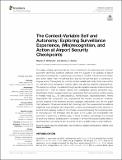Files in this item
The context-variable self and autonomy : exploring surveillance experience, (mis)recognition, and action at airport security checkpoints
Item metadata
| dc.contributor.author | McNamara, Meghan E. | |
| dc.contributor.author | Reicher, Stephen D. | |
| dc.date.accessioned | 2019-10-22T08:30:05Z | |
| dc.date.available | 2019-10-22T08:30:05Z | |
| dc.date.issued | 2019-10-22 | |
| dc.identifier | 261314972 | |
| dc.identifier | 7371f065-9f48-4026-91c2-9a953ceff75c | |
| dc.identifier | 85074494046 | |
| dc.identifier | 000496456800001 | |
| dc.identifier.citation | McNamara , M E & Reicher , S D 2019 , ' The context-variable self and autonomy : exploring surveillance experience, (mis)recognition, and action at airport security checkpoints ' , Frontiers in Psychology , vol. 10 , 2258 . https://doi.org/10.3389/fpsyg.2019.02258 | en |
| dc.identifier.issn | 1664-1078 | |
| dc.identifier.uri | https://hdl.handle.net/10023/18734 | |
| dc.description.abstract | This paper critiques and extends the notion of autonomy by examining how common autonomy definitions construct selfhood, with the support of an analysis of airport surveillance experiences. In psychology, autonomy is 1) often oriented around volition and action rather than the-self-that-acts and 2) the-self-that-acts is construed in singular terms. This neglects the multiple, context-variable self: while others may confirm our self-definitions (recognition), identity claims may also be rejected (misrecognition). The autonomy critique is sustained through an ethnographic analysis of airport security accounts (N = 156) in multiple nations with comparable security procedure (e.g., identification checks, luggage screening, questioning). Such procedures position people in multiple ways (e.g. as safe/dangerous, human/object, respectable/trash). Where respondents felt recognized, they experienced the security procedures positively, actively assisted in the screening process (engaged participation), and did not adapt their behaviors. Where respondents felt misrecognized, they experienced surveillance negatively, were alienated, and responded by either accommodating their behavior to avoid scrutiny, seeking to disrupt the process, or else withdrawing from screening sites. In misrecognition, the strategies that are open to the subject are incompatible with autonomy, if autonomy is defined solely in terms of volition. Accordingly, the concept of autonomy needs to be analyzed on two levels: in terms of the subject’s ability freely to determine their own sense of self, as well as the actor’s ability freely to enact selfhood. | |
| dc.format.extent | 19 | |
| dc.format.extent | 1079177 | |
| dc.language.iso | eng | |
| dc.relation.ispartof | Frontiers in Psychology | en |
| dc.subject | Airports | en |
| dc.subject | Autonomy | en |
| dc.subject | Imposed categories | en |
| dc.subject | Recognition/misrecognition | en |
| dc.subject | Security | en |
| dc.subject | Social identity | en |
| dc.subject | Surveillance | en |
| dc.subject | Frame of reference | en |
| dc.subject | Identity claims | en |
| dc.subject | Selfhood | en |
| dc.subject | BF Psychology | en |
| dc.subject | NDAS | en |
| dc.subject.lcc | BF | en |
| dc.title | The context-variable self and autonomy : exploring surveillance experience, (mis)recognition, and action at airport security checkpoints | en |
| dc.type | Journal article | en |
| dc.contributor.institution | University of St Andrews. School of Psychology and Neuroscience | en |
| dc.contributor.institution | University of St Andrews. Centre for Research into Equality, Diversity & Inclusion | en |
| dc.contributor.institution | University of St Andrews. St Andrews Sustainability Institute | en |
| dc.identifier.doi | 10.3389/fpsyg.2019.02258 | |
| dc.description.status | Peer reviewed | en |
This item appears in the following Collection(s)
Items in the St Andrews Research Repository are protected by copyright, with all rights reserved, unless otherwise indicated.

